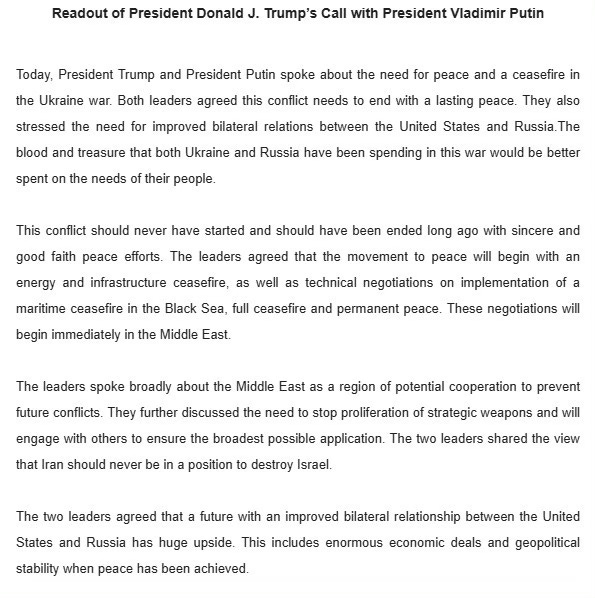The Ceasefire That Isn't
Putin rejected Trump's call for a 30-day ceasefire, but you wouldn't know that from the White House's readout.
President Trump got on the phone with Vladimir Putin for the second time in four weeks to ask a simple question: “Will you please agree to a 30-day ceasefire in the war with Ukraine?” Putin’s answer was clear: “No, thanks.” But you wouldn’t know it from the White House’s readout of the call (see below).
The big “news” from the call was Putin’s apparent agreement to “an energy and infrastructure ceasefire.” But its meaning is unclear. Reports from Washington and Moscow speak of a ceasefire on energy targets; but the White House statement refers to a ceasefire on “energy and infrastructure.” There is a big difference between energy and other infrastructure—and the latter could include all kinds of civilian and military targets.
From Putin’s perspective, a ceasefire on just energy targets could make some sense. In recent months, Ukraine has struck numerous energy targets—refineries, oil storage sites, and more—sometimes deep inside Russia. If a ceasefire ended those strikes, that would help. Russia, meanwhile, has destroyed a large part of Ukraine’s energy infrastructure, and with Spring just around the corner, the strategic impact of continuing these strikes is diminishing.
But, of course, a ceasefire on energy targets wouldn’t end the war. The vast bulk of fighting is happening on the ground and in the air—that’s what’s killed and wounded well over a million people on both sides. And if the ceasefire does not apply to non-energy infrastructure, as seems likely, Russia will continue its indiscriminate bombing of cities and towns, which has killed and wounded large numbers of innocent civilians.
What’s more, the statement is unclear as to when this ceasefire will be instituted, how long it will last, and who will monitor its implementation. All these issues are presumably going to be addressed in the negotiations that will begin “immediately” in the Middle East. But who will be at these negotiations? Russian and US mediators? If so, what about Ukraine? How does the administration propose to conduct the “technical negotiations on implementation of a maritime ceasefire, full ceasefire and permanent peace” with Russia and not with Ukraine? I get why Putin might want to exclude the Ukrainians, because he has no interest in ending the war. But Trump says he does want to end the war, but that can only happen with both parties at the table.
Interestingly, the White House readout suggests that the real motivation behind Trump’s efforts to end the war in Ukraine is to normalize relations with Russia. The statement makes clear that the war “should never have been started” (as if it just happened spontaneously). And adds that it has cost both Ukraine and Russia “blood and treasure” that would have been better spent elsewhere (as if Ukraine had a choice).
But to Trump, the war stands in the way of building what the readout calls “an improved bilateral relationship” that will have “huge upsides”—including “enormous economic deals”—once peace has been achieved. So we need to end it.
Now, the best way to end the war would be to convince the aggressor—that is Russia—that it cannot achieve its objectives. And that requires fully supporting Ukraine and tightening sanctions on Russia. But, of course, those steps assume that Russia is an implacable foe rather than a partner with whom Trump can make “enormous” deals.
Putin clearly has Trump’s number. He promises good bilateral relations and huge deals once the war is over. But he won’t end the war until he has achieved his goal of subjugating Ukraine. And he can’t succeed unless he convinces Trump to end support for Ukraine and take his side in the conflict.
Today’s call gets him one step closer to achieving that goal.






Latest - Mar. 18, 2025, 10:33 pm local time:
Strikes on the eastern Ukrainian cities of Slovyansk and Kramatorsk occurred in the wake of Trump and Putin agreeing on a 30-day cessation of attacks on energy infrastructure.
Russia launched an airstrike on the energy infrastructure of Slovyansk, a city of 100,000 people in the Donetsk region of Ukraine, according to locals reporting videos.
Kyiv Post sources within the military confirmed that part of the city is now without electricity.
Meanwhile, explosions were reported in Kramatorsk, where guided aerial bombs reportedly struck residential areas.
https://www.kyivpost.com/post/49156
How about the fact that last night Netanyahu’s war machine killed at least 400 Palestinians and no Democratic or Republican politicians even bothered to acknowledge the carnage. I am truly ashamed as an American whose government is supplying the weapons. Where is our humanity!???